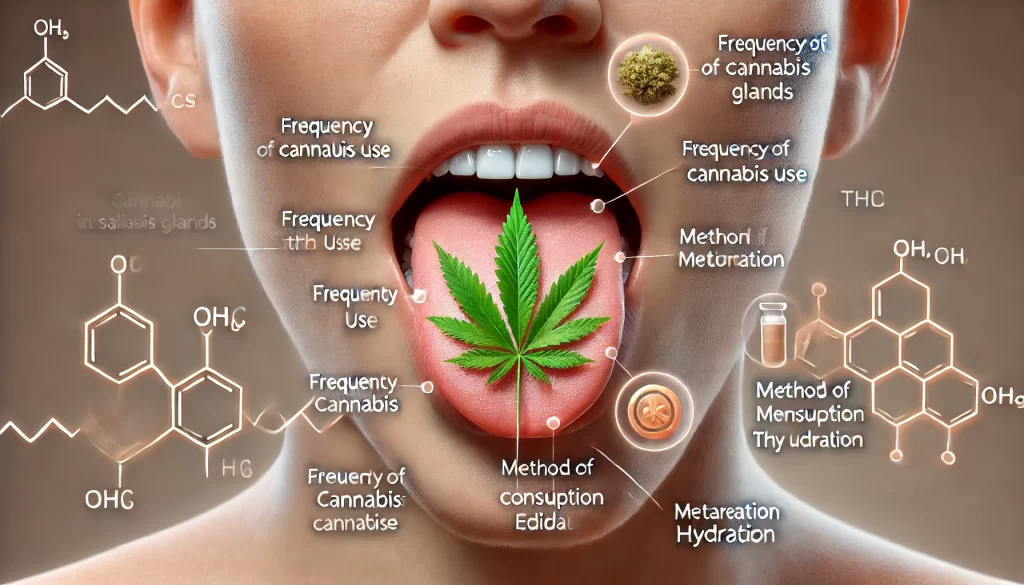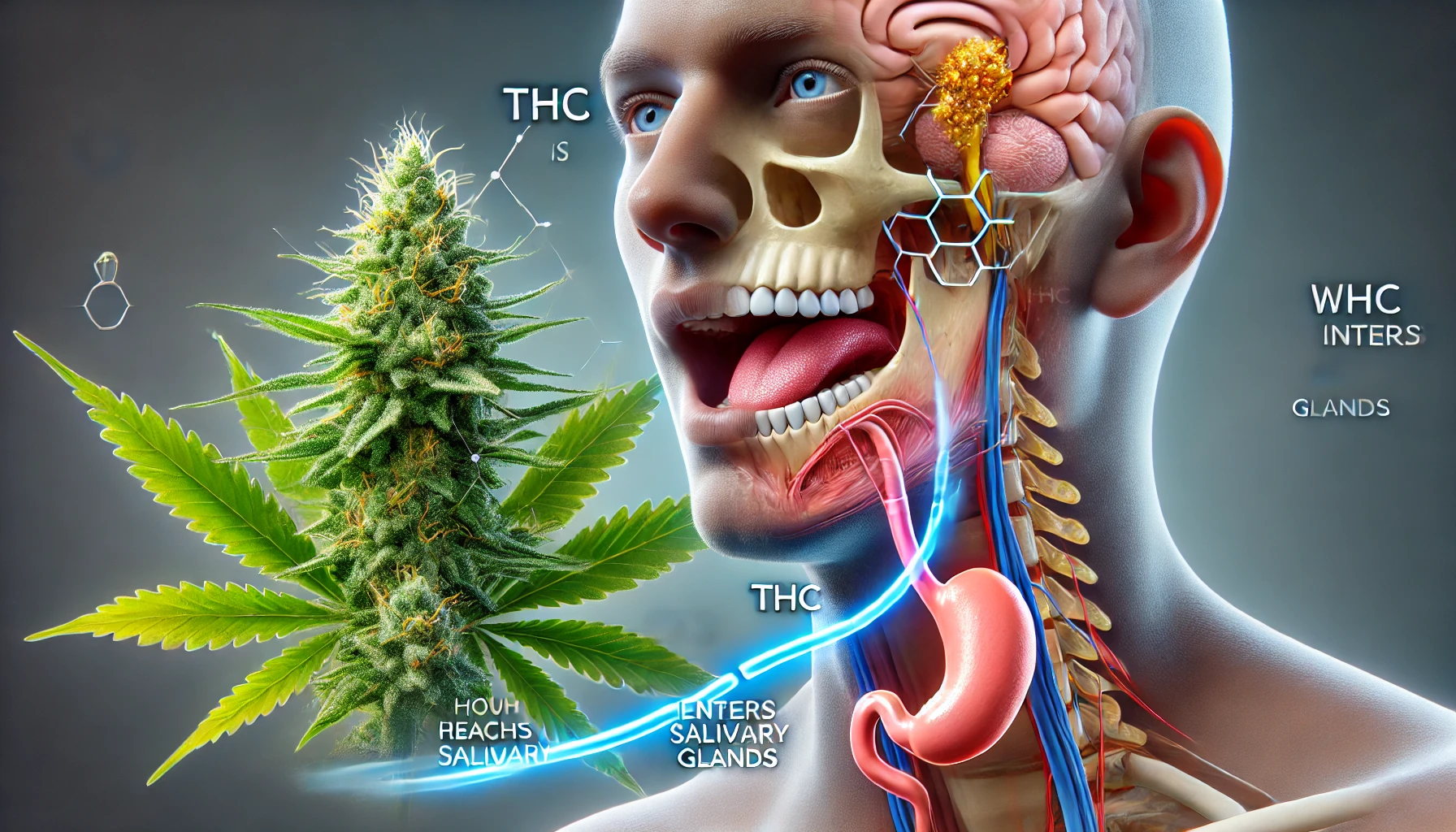Table of Contents
If you’re wondering, “How long does THC stay in saliva glands?” you’re not alone. Whether you’re a frequent cannabis user or someone who’s tried it once, understanding how long THC lingers in your system can be crucial. This article dives deep into the facts, helping you grasp the shocking truth about THC and its stay in your saliva glands. This knowledge is essential if you need to pass a saliva drug test or are simply curious about how THC works in your body.
What is THC and How Does It Enter Your Saliva?

THC Overview
How long does THC stay in saliva glands? Tetrahydrocannabinol, or THC, is the psychoactive compound in cannabis responsible for the “high” sensation. When you consume cannabis, THC enters your bloodstream and travels throughout your body, including your saliva glands. But how exactly does it reach your saliva glands?
How THC Enters Saliva Glands
When you smoke or ingest cannabis, THC can enter your saliva in two primary ways. First, it can pass directly into your mouth when smoking or vaping. Second, THC in your bloodstream can diffuse into your saliva glands, making it detectable in saliva. The way THC enters and stays in your saliva depends on several factors, including the method of consumption, frequency of use, and your body’s metabolism.
Factors Affecting THC Retention in Saliva Glands
Frequency of Use
How long does THC stay in saliva glands? One key factor is how often you use cannabis. Frequent users may notice that THC remains in their saliva longer than it does for occasional users. Over time, THC can build up in your system, increasing the chances of it showing up in a saliva test even days after your last use.
Method of Consumption
The way you consume cannabis also plays a role in how long THC stays in your saliva glands. Smoking or vaping usually results in a quicker onset of THC in saliva, but it might also leave your system faster. On the other hand, edibles take longer to break down, which can lead to THC staying in your saliva for an extended period.
Metabolism and Hydration
How long does THC stay in saliva glands? Your body’s metabolism plays a crucial role in this. Those with faster metabolisms tend to process and eliminate THC from their saliva more quickly. Additionally, staying hydrated can help speed up the removal of THC from your saliva glands. Drinking water boosts saliva production, which can dilute the THC concentration in your mouth, helping it clear out faster.
How Long Does THC Stay in Saliva Glands?
General Timeline
The big question, “How long does THC stay in saliva glands?” has a different response based on the elements we have talked about. Generally, THC can be detected in saliva for up to 24 to 72 hours after use. However, it can be detected for even longer, sometimes up to a week, for heavy users.
Saliva Drug Tests
Saliva drug tests are designed to detect recent cannabis use. These tests are commonly used because they are non-invasive and can quickly show if someone has used cannabis in the last few hours or days. THC is likely to be detectable in saliva for about 24 hours for most occasional users. However, if you are a heavy user, THC might be detectable for several days after your last use.
How to Speed Up THC Removal from Saliva Glands
Increase Hydration
How long does THC stay in saliva glands? If you’re worried about it lingering, one effective way to speed up its removal is by drinking more water. Staying hydrated increases saliva production, which can help flush THC out of your mouth more quickly.
Practice Good Oral Hygiene
Brushing your teeth, using mouthwash, and chewing gum can also help reduce the amount of THC in your saliva. These practices can help remove traces of THC from your mouth, lowering the chances of detection in a saliva test.
Time
Ultimately, time is your best ally when it comes to clearing THC from your saliva glands. The longer you wait after using cannabis, the less likely it is that THC will be detectable in your saliva. If you’re facing a saliva test, abstaining from cannabis for at least 24 to 72 hours can significantly reduce the likelihood of a positive result.
Also Read: How Long Does It Take to Recover from a Root Canal? Discover Now!
Common Myths About THC in Saliva Glands
Myth 1: Drinking Vinegar or Detox Drinks Eliminates THC Immediately
There are many myths about how to quickly eliminate THC from your saliva, such as drinking vinegar or detox drinks. While staying hydrated is essential, these methods don’t guarantee that THC will be cleared from your saliva glands instantly. They might help to some extent, but they could be more foolproof.
Myth 2: THC Disappears from Saliva as Soon as the High Wears Off
Some people believe that once the effects of cannabis wear off, THC is no longer present in their saliva. This is not true. THC can remain in your saliva glands even after the psychoactive effects have faded. This is why it’s possible to test positive on a saliva drug test hours or even days after use.
Myth 3: Saliva Drug Tests Are Inaccurate
While no test is 100% accurate, saliva drug tests are generally reliable for detecting recent cannabis use. Some people think they can easily beat these tests, but the reality is that if you’ve used cannabis recently, there’s a good chance THC will be detected.
How long does THC stay in saliva glands? Understanding this is crucial, particularly if you’re preparing for a drug test or want to know how cannabis impacts your body. The duration THC stays in your saliva depends on several factors, including how often you use cannabis, your method of consumption, your metabolism, and your hydration levels. While there are methods to accelerate THC removal from your saliva, the most reliable approach is simply to wait it out.
If you’re ever asking yourself, “How long does THC stay in saliva glands?” remember that the answer can vary widely. Being informed and taking the proper steps can help you manage your THC levels and navigate situations where drug testing might be a concern.

